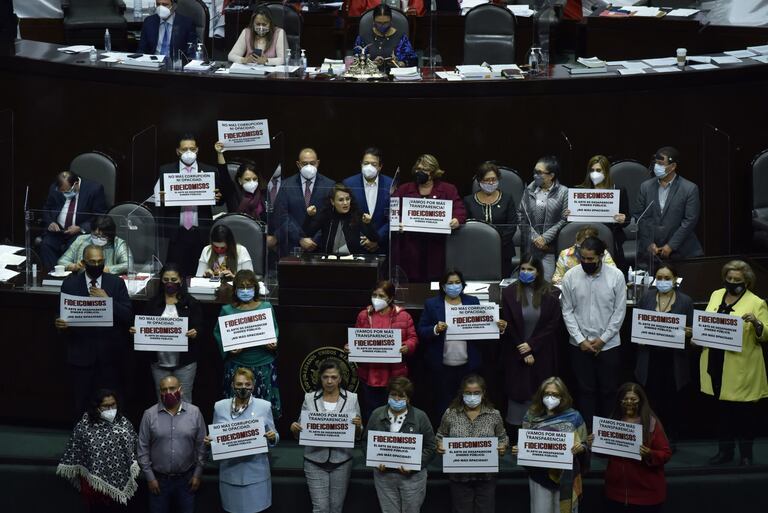Opposition deputies protest in Congress against the elimination of 109 trusts Mario Jasso /
In fits and starts, but finally Morena has managed to carry out one of the most controversial measures of the austerity imposed by Andrés Manuel López Obrador.
Despite being a requirement of the president herself and despite having an absolute majority in Congress, the party in power has had to roll up its sleeves to get approval of the decree that eliminates 109 public trusts.
A measure that, since it was proposed in April, has met with strong rejection both among the opposition parties and among the scientific, cultural, academic and sports sectors, beneficiaries of this financing route definitively cut off this Tuesday in the plenary session of Congress.
The extinction of the trusts, which contain about 68,000 million pesos (more than 3,000 million dollars), has opened cracks even within Morena and his parliamentary allies.
After the approval of the opinion in the Budget Committee, last Thursday the endorsement in plenary was not possible.
The absence of the Labor Party (an ally of Morena) during the session prevented the necessary quorum from being reached.
The quorum fight was repeated this Tuesday in the second parliamentary attempt.
In a harsh atmosphere, the president of the Chamber, the PRI Dulce María Sauri, was forced to repeat the count of deputies present in the hemicycle, after another failed first attempt.
From the morenista bench, it was even urged to deduct the salary of the deputies who, despite being present, refused to vote on the decree, accusing the parliamentarians who were using this trick to sabotage the vote as "chicaneros".
"We are not going to vote for the dispossession of scientists, journalists or victims," defended one of the deputies of the Citizen Movement, referring specifically to one of the funds that channeled funding for threatened human rights defenders and journalists.
Hours before the vote, a group made up of scientists, victims and actors appeared in Congress to try to stop the approval of the rule.
Finally, the decree, which modifies 14 laws and repeals one, went ahead with 242 votes in favor, 178 against and seven abstentions.
Morena, Green Party and Social Encounter supported the measure.
Although not in block.
Deputy Lorena Villavicencio was one of the rebellious Morenoites.
"The money from the trusts," she defended in statements to the press, "does not only come from the treasury, so that by canceling them, the Mexican government closes an additional source of financing to fulfill its duties."
The decree also had 398 reservations, where the opposition deputies and Morena's allies with the PT have stressed over and over again that "each trust is different."
The greatest criticism of the elimination of these financing instruments for public organizations with a long tradition in Mexico is the imposition of nipping all of them in the bud, accused of being a source of opacity and corruption, without taking into account the different specificities and needs that each of them cover.
“It is true that in some cases, they are instruments that have allowed arbitrariness in the management of funds, through, for example, fiduciary secrecy.
But this does not happen in all cases and instead of cutting with a scalpel, it has been cut with a machete ”, points out Leonardo Núñez, researcher for Mexicans Against Corruption.
The scientific sector especially denounces the inefficiency of a measure that will destroy one of the sectors with the highest added value in the country in exchange for raising a very low amount of money in relative terms.
According to their calculations, of the money bag that the trusts contain, only 2.8% corresponds to science and technology.
Just 2,000 million pesos out of a total of 78,000.
Continuing with his calculations, three trusts accumulate 96% of the funds.
They are the Natural Disaster Fund, the Trust relating to the Customs Law and another to promote the energy industry.
In an attempt to quell the gale of criticism, both López Obrador and the rest of the Government cadres have long insisted that a large part of the funds will continue to flow directly through various secretariats and agencies, after dedicating another part of resources to the health system, battered by the blows of the pandemic.
It is not clear, however, what the new institutional design will be in this regard.
For now, the 68,000 million will go to the coffers of the Ministry of Finance, which is already planning the General Budgets for 2021. The secretary of the branch, Arturo Herrera, came out yesterday Wednesday to ensure that the financing will be carried out by way of direct to the beneficiaries, as is already the case, for example, with the National System of Researchers.













/cloudfront-eu-central-1.images.arcpublishing.com/prisa/KMEYMJKESBAZBE4MRBAM4TGHIQ.jpg)

